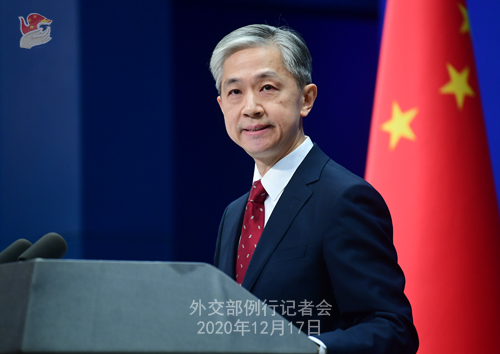


Wang Wenbin speaks at a regular press conference of China's Foreign Ministry on Dec. 17, 2020. (Photo from the Foreign Ministry website)
BEIJING, Dec. 17 (Xinhua) -- A spokesperson for China's Foreign Ministry on Thursday reiterated that China is committed to the principle of non-interference, noting that claims about China influencing U.S. presidential elections are "completely fabricated."
Spokesperson Wang Wenbin made the remarks at a daily news briefing when asked to comment on a statement from the Office of the U.S. Director of National Intelligence John Radcliffe, saying a deadline to submit a classified report to Congress on foreign efforts to sway the Nov. 3 election will not be met.
According to reports, it is because Radcliffe is said to be refusing to sign off on the report, unless it more fully reflects the national security threat posed by China.
Wang told the press that Ratcliffe had not long ago called China "national security threat no.1," yet some U.S. media pointed out that there is some data missing in his analysis -- data that reveals that partnership with China, not antagonism, should be pursued.
"I reiterate that China is committed to the principle of non-interference. Claims about China influencing U.S. presidential elections are completely fabricated," Wang said.
 Fire brigade in Shanghai holds group wedding
Fire brigade in Shanghai holds group wedding Tourists enjoy ice sculptures in Datan Town, north China
Tourists enjoy ice sculptures in Datan Town, north China Sunset scenery of Dayan Pagoda in Xi'an
Sunset scenery of Dayan Pagoda in Xi'an Tourists have fun at scenic spot in Nanlong Town, NW China
Tourists have fun at scenic spot in Nanlong Town, NW China Harbin attracts tourists by making best use of ice in winter
Harbin attracts tourists by making best use of ice in winter In pics: FIS Alpine Ski Women's World Cup Slalom
In pics: FIS Alpine Ski Women's World Cup Slalom Black-necked cranes rest at reservoir in Lhunzhub County, Lhasa
Black-necked cranes rest at reservoir in Lhunzhub County, Lhasa China's FAST telescope will be available to foreign scientists in April
China's FAST telescope will be available to foreign scientists in April "She power" plays indispensable role in poverty alleviation
"She power" plays indispensable role in poverty alleviation Top 10 world news events of People's Daily in 2020
Top 10 world news events of People's Daily in 2020 Top 10 China news events of People's Daily in 2020
Top 10 China news events of People's Daily in 2020 Top 10 media buzzwords of 2020
Top 10 media buzzwords of 2020 Year-ender:10 major tourism stories of 2020
Year-ender:10 major tourism stories of 2020 No interference in Venezuelan issues
No interference in Venezuelan issues
 Biz prepares for trade spat
Biz prepares for trade spat
 Broadcasting Continent
Broadcasting Continent Australia wins Chinese CEOs as US loses
Australia wins Chinese CEOs as US loses